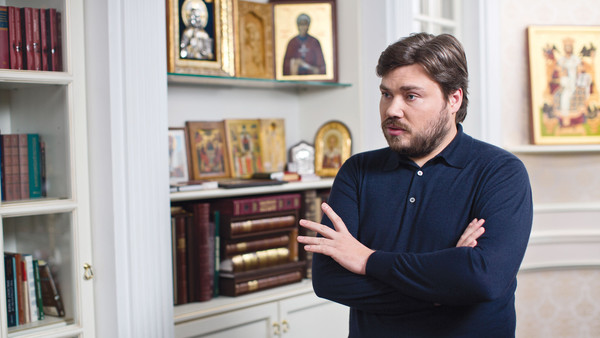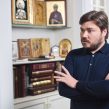
Hot Issue – Konstantin Malofeev: Fringe Christian Orthodox Financier of the Donbas Separatists
By:

Executive Summary
The Russia-supported separatists operating in eastern Ukraine as well as some of their backers in Russia are increasingly espousing a radical ideology based on a meld of Christian Orthodoxy, expansionist Eurasianism, and irredentist state aggression. One important figure closely tied into this group is Konstantin Malofeev. A self-described “Orthodox businessman,” Malofeev is believed to personally finance the Donbas separatist operation and have direct links to President Vladimir Putin’s inner circle. Although he has been sanctioned by both the European Union and Canada, to date Malofeev has not come under US sanctions and flies under the radar of Washington policymakers.
Introduction
On July 28, as the Russian-Ukrainian conflict continued to escalate, Russia marked the Day of Baptism of Rus. Simultaneously, Ukraine held celebrations for the Day of Baptism of Kyivan Rus and commemorated Volodymyr the Great (980–1015)—a Great Prince of Kyivan Rus who introduced Orthodox Christianity as the principality’s state religion. The dual observances in Moscow and Kyiv illustrate the importance of the Christian Orthodox faith to the cultural identities of both nations as well as their competing desires to lay claim to its roots. But meanwhile, a radical fringe version of Orthodox Christianity has been growing in importance among the backers of the Russia-sponsored separatist movement in eastern Ukraine’s Donbas region. This Orthodox-based ideology justifies Moscow’s irredentist politics and openly welcomes Russia’s hybrid warfare against Ukraine and other potential Eurasian states. Both the official Russian Orthodox Church led by Patriarch Kirill, as well as its “affiliated” Ukrainian Orthodox Church (Moscow Patriarchate), have cautiously distanced themselves from the Donbas militants and pro-Kremlin hardliners who espouse these pseudo-Orthodox views. Nonetheless, the fringe Orthodox movement has attracted support from several high positions around the Kremlin, including an activist Russian “Orthodox businessman,” who has been accused of financing much of the Donbas rebellion.
Malofeev: Radical “Orthodox Businessman”
The Russian “Orthodox businessman” in question is Konstantin Malofeev, the founder of the investment firm Marshall Capital and, at one point, the largest minority shareholder in the Russian telephone company Rostelecom. Malofeev seems to have close connections to Russian political technologist (and, until recently, the supposed “prime minister” of the self-proclaimed “Donetsk People’s Republic”) Aleksandr Boroday and to military commander Igor Girkin (a.k.a. Strelkov). As evidenced from a conversation intercepted by the Security Service of Ukraine (SBU) during the early days of escalation of the Donbas conflict, Strelkov allegedly reported to Malofeev about killing a high-ranking Ukrainian counter-terrorism official. In turn, Malofeev is allegedly heard on the tape encouraging Strelkov to pursue the military operation in Slovyansk without hesitation. The Russian businessman also congratulated Strelkov on a “well-marked” holiday of Verbnoye (Palm) Sunday (Novosti Dnya, April 14).
Konstantin Malofeev is believed by some observers to be one of the primary financiers of the entire separatist operation in eastern Ukraine, acting on the personal directives of Russian President Vladimir Putin. The arguments in support of this reasoning were laid out in a May 27 investigative article by the Russian online media outlet The Insider (The Insider, May 27). The article refers to the contents of a hacked e-mail written by Strelkov in which the Donbas military commander claims that in the spring of 2014 he was employed as the security chief at Marshall Capital. In another e-mail released by The Insider, which Strelkov allegedly sent four years earlier, he muses about staging a “Transnistria scenario” in Ukraine and notes that “some of his friends” were involved in planning the operation. Importantly, the same e-mail mentions that the financing for this operation was being “allocated by Staraya Ploshchad [4 Starya Ploshchad is the address of the Presidential Administration building in Moscow].” The Insider further investigated Malofeev’s alleged current connections to President Putin’s administration, including Putin’s chief of staff, Sergei Ivanov, as well as Ivanov’s son. The online news source concluded that the circle of Malofeev’s contacts included Russian Communications Minister Igor Shchegolev and Father Tikhon (Georgiy Aleksandrovich Shevkunov), who presides over Sretensky Monastery and is believed to be Vladimir Putin’s personal confessor (dukhovnik). The Insider further deduced that most likely Moscow is making “direct use of Malofeev’s [financial] resources for combat operations in southeastern Ukraine without the official involvement of the Russian Armed Forces” and suggested that Father Tikhon actually might have acted as a liaison between Malofeev and the Kremlin (The Insider, July 25).
Konstantin Malofeev has openly denied his alleged role in the Ukraine war, as well as repudiated the suggestions of Strelkov’s employment with Marshall Capital (Forbes-Russia, May 21). Nevertheless, he welcomed being called an “Orthodox businessman” and sought to highlight his role in sponsoring “humanitarian aid.” However, he has been unable to entirely hide his more radical activities. For example, this past June, a Swiss newspaper reported that Malofeev had sponsored a gathering in Vienna of radical nationalists, ideological proponents of “Eurasianism” and European far-right politicians. At this meeting, ultranationalist Russian philosopher Aleksandr Dugin was a keynote speaker (Tages Anzeiger, June 3). Moreover, Russian journalist Oleg Kashin—one of the first to write about Malofeev’s alleged role in the Ukraine crisis—also reported that in the 1990s, this notorious Russian businessman had contact with Orthodox Church Metropolitan Ioann (Snychev), who has a reputation of being “openly fascist” and who later “made friends with Dugin” (Slon, May 19). Dugin is particularly well known for his Eurasianist (Russian imperialist) views and as a proponent of Russia’s irredentist war against Ukraine.
A lawyer and an investment banker who founded Marshall Capital Partners in 2005, Malofeev has been accused of “raidership” influence over the Russian telecommunications monopoly Sviazinvest (Lenta.ru, November 1, 2010). His funds accumulated a 10-percent stake in Rostelecom, one of Russia’s most powerful telephone companies. And in February 2013, his company was searched by authorities in relation to a criminal investigation involving a VTB loan to of one of his assets (Forbes-Russia, February 4, 2013). Marshall Capital supports the Saint Basil the Great Charitable Foundation, which Malofeev personally established in 2007, as well as a range of other projects (Marshall Capital, July 30). On July 22, the Ukrainian Ministry of Interior opened a criminal case against Konstantin Malofeev on charges of financing unlawful military groups (RBC, July 22). He was placed on the European Union’s sanctions list on July 30 for his role in supporting the armed separatist movements in Ukraine (eur-lex.europa.eu, July 30), and was also added to Canada’s sanctions list on August 6 (international.gc.ca, August 6); but so far officials in the United States have failed to subject him to US sanctions.
Religious Justification for Russian Imperialism
Malofeev’s alleged partnership with Father Tikhon in funding the Donbas rebels further underscores the centrality of radical Christian Orthodox thought in guiding Russia’s imperialist policies. Father Tikhon is known for being a conservative intellectual, a writer and director of several documentaries, as well as the editor of the Russian Orthodox Church web portal Pravoslavie.ru. His beliefs blend Orthodox conservatism with ideologies linked to the cultural legacy of the Soviet Union and Russian irredentism. Father Tikhon is believed to be especially close to Putin—he is the Russian president’s spiritual confessor. Illustratively, in a recent SBU counter-intelligence recording, a former United Russia party official states that Father Tikhon’s help would be needed to defend warlord Igor Strelkov’s fading reputation before Vladimir Putin (SBU YouTube Channel, July 25). Putin and Father Tikhon’s “geopolitical” views are remarkably similar. Both dwell on a cold war–style confrontation between Russia and the West (The Trinity Temple at Vorobyevy Hills , June 21, 2013). Notably, the idea of the “Russkiy Mir” or “Russian World,” which is openly promoted by the official Russian Orthodox Church, easily combines with nostalgia for the Soviet Union’s bygone hard power and global dominance. The resulting ideology serves as philosophical justification for Russia’s irredentist wars in its neighborhood.
Finally, the aforementioned sectarian pseudo-Orthodox doctrine is widely employed by the Russia-backed insurgents operating in Donbas. On July 28, for example, Strelkov issued an order banning the militants from using obscene language. In this directive, Strelkov referred to the rebels as an “Orthodox Army” and labeled his enemies “haters of Christians” who, he proclaimed, “seized power in Kyiv and order Orthodox Ukrainians to fire at their own temples [and] sneer at [Orthodox] Banners [religious icons] and the Orthodox Clergy” (Informastionniy Korpus, July 28). A couple days earlier, an editorial on the militants’ official website stated: “We fight for the Faith of Christ […] after the West unleashed a new campaign with the purpose to destroy the Orthodox-Slavic world. This is why the Opolcheniye [militia] is called The Orthodox Host…” (Informatsionniy Korpus, July 26).
Conclusion
From a purely religious perspective, the militants’ sectarianism has little in common with true Orthodox Christianity. But there is a distinct danger that the Russian Orthodox Church and even Russian authorities may be increasingly swayed by its radical nationalist ideology, the consequences of which could lead to further chaos and unrest along Russia’s borders. Consequently, proponents of this dangerous ideology such as Konstantin Malofeev—who have deep pockets and whom the Kremlin can, seemingly, count on to finance artificial militant rebellions abroad—pose a specific threat to Western policies and should not be ignored.




